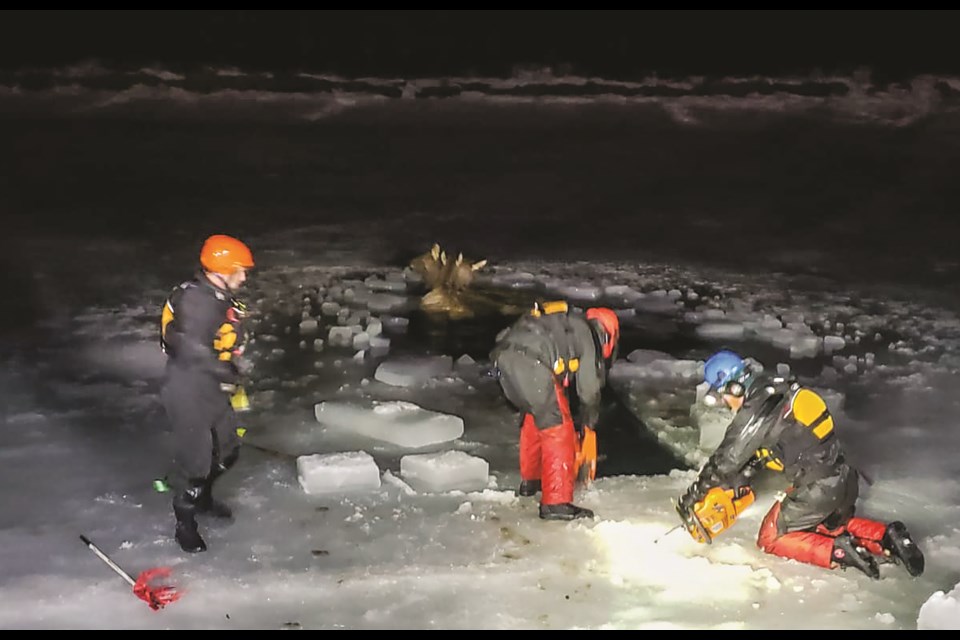BANFF – National park wildlife specialists went to extraordinary lengths to save elk that fell though the ice of the Bow River near the Banff townsite this week.
An elk calf was plucked from the frigid waters upstream of the canoe docks about 5 p.m. on March 31, and a few days earlier on March 27, dedicated staff worked tirelessly throughout the night to save four elk that had fallen through the ice.
Three of the four adult cow elk survived Saturday evening’s stressful ordeal, but one animal had to be put down despite efforts by park resource conservation officers for almost 12 hours to save her.
“By 6:30 in the morning she was getting weaker and weaker; she was suffering and we ended up euthanizing her,” said Blair Fyten, a Parks Canada human-wildlife management specialist.
“We had her all wrapped up in blankets, but it didn’t work, unfortunately.”
The ordeal began when a crowd of people, many who were taking photographs, scared a large herd of elk onto the ice of the river by Central Park at about 6:30 p.m.
When resource conservation officers arrived to get people to back off, the elk herd of about 30 splintered off into different areas. One group of five tried to cross the river between Central Park and the canoe docks.
“One made it across and then there was another group of four that followed and they all broke through the ice,” Fyten said.
More staff were called in to help, arriving with proper safety gear and equipment including dry suits.
In total, there were five resource conservation specialists who tried to save the elk, including two that stayed with the animals throughout the entire night.
Fearing the elk would succumb to hypothermia and drown while in the frigid water, staff cut a 15-metre channel through the ice with chainsaws to try to get the animals to safety.
“Once we got that channel cut, we proceeded to get a rope behind one elk at a time and directed them down the channel,” Fyten said.
“We got some additional straps on them because they weren’t able to jump up onto the ice edge, and we got all four of them hauled up onto the ice.”
The elk were in the water for about two hours.
One elk had enough strength to get on the ice and take off immediately. Another one, though weak, also managed to get up and flee some time later.
The two remaining elk were hauled up a four-foot vertical embankment to drier ground with a plastic toboggan. The animals were kept in a sternal position to allow them to breathe more normally.
“One remained in this position until 3:30 a.m., at which point I forced her up to get the circulation going. She was not able to move off for another three hours,” Fyten said.
“The last one we tried until 6 a.m. to recover, but unfortunately all the efforts did not work and we had to euthanize her. There was quite the effort put into getting these elk up and onto the ice and try and save them.”
In Wednesday’s early evening incident involving the elk calf, park staff were quick to respond to the call.
“We managed to get it out quickly… it was in better shape,” Fyten said.
“We left it on the bank and checked later in the evening and it had moved slightly. When we checked this morning, she had moved on.”
In addition, a dead elk was found in the Bow River near Central Park on Thursday morning (April 1).
Fearing the carcass could draw carnivores to town, it was removed.
“The carcass was fresh, very near to where we pulled the other four out,” Fyten said.
In early January, Parks Canada staff tried to save a hypothermic cow elk that fell through the ice of Bow River near Central Park, but she ended up dying from the trauma.
After pulling that animal from the river, staff spent the next six-and-a-half hours trying to warm her with blankets and heaters on the shore by the recreation grounds.
When elk fall though the river ice in highly visible and developed locations, Parks Canada typically makes the decision to try to save them. When this happens out of view or in a less busy areas, they often let nature take its course.
“We wouldn’t have even got a call likely if it happens a mile up the river,” Fyten said. “In a case like that, if the elk couldn’t get themselves out they would probably succumb to hypothermia and drown.”
Parks Canada requests these types of incidents be reported to Banff dispatch at 403-762-1470.
“We ask that you do not attempt to try and help those elk on your own,” Fyten said.
“We have all the safety gear and equipment and we’re trained to get out on the thin ice.”



